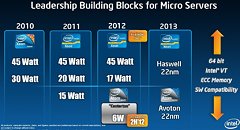- Joined
- Oct 9, 2007
- Messages
- 47,743 (7.42/day)
- Location
- Dublin, Ireland
| System Name | RBMK-1000 |
|---|---|
| Processor | AMD Ryzen 7 5700G |
| Motherboard | Gigabyte B550 AORUS Elite V2 |
| Cooling | DeepCool Gammax L240 V2 |
| Memory | 2x 16GB DDR4-3200 |
| Video Card(s) | Galax RTX 4070 Ti EX |
| Storage | Samsung 990 1TB |
| Display(s) | BenQ 1440p 60 Hz 27-inch |
| Case | Corsair Carbide 100R |
| Audio Device(s) | ASUS SupremeFX S1220A |
| Power Supply | Cooler Master MWE Gold 650W |
| Mouse | ASUS ROG Strix Impact |
| Keyboard | Gamdias Hermes E2 |
| Software | Windows 11 Pro |
With ARM gaining a foothold in the micro-server market, with multi-core processors, Intel is stepping up its response. A key component of Intel's next-generation "Edisonville" micro-server platform, Atom "Avoton" will be designed with a formidable feature-set over what the current-generation Atom "Centerton" offers, according to a MyDrivers report based on a leaked company slide.
Atom "Avoton" will be built on Intel's 22 nm silicon fabrication process, with anywhere between 2 to 8 cores, backed by 1 MB to 4 MB L2 cache. The cores will be designed to support out-of-order processing, correcting a longstanding limitation of Atom processors. The cores will likely be designed with a balanced instruction set to maximize performance per Watt. Processors in the Atom "Avoton" series will be clocked around 2.40 GHz, and will support Turbo Boost technology, which drives core clock speed up to 2.70 GHz. Another big feature change is an expanded IMC, which will support dual-channel DDR3-1600 / DDR3-1600L memory. Enterprise features such as ECC memory and Intel VT, will be included. The chips will likely be built in FCBGA packages. TDP for these chips will be under 20W.

View at TechPowerUp Main Site
Atom "Avoton" will be built on Intel's 22 nm silicon fabrication process, with anywhere between 2 to 8 cores, backed by 1 MB to 4 MB L2 cache. The cores will be designed to support out-of-order processing, correcting a longstanding limitation of Atom processors. The cores will likely be designed with a balanced instruction set to maximize performance per Watt. Processors in the Atom "Avoton" series will be clocked around 2.40 GHz, and will support Turbo Boost technology, which drives core clock speed up to 2.70 GHz. Another big feature change is an expanded IMC, which will support dual-channel DDR3-1600 / DDR3-1600L memory. Enterprise features such as ECC memory and Intel VT, will be included. The chips will likely be built in FCBGA packages. TDP for these chips will be under 20W.

View at TechPowerUp Main Site


